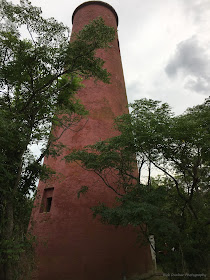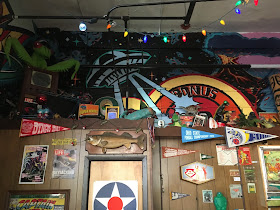 On Sunday, the adage "good things come to those who wait" was confirmed. For two years, I have been wanting to do the Cape Romain Lighthouses Tour, but for various reasons ranging from conflicting schedules to being sold out, the highly coveted opportunity had been as elusive as the red wolf. There are only four tours scheduled through the year and timing is everything. The next tour is scheduled for October. I almost did not make this one. It too was sold out. I had my name put on the waiting list in case there was a cancelation and as fate would have it, lightning struck. I am thinking the threat of thunderstorms forecasted for the day of the tour, which was July 16, may have presented me the necessary thunder. Thank you, Mother Nature.
On Sunday, the adage "good things come to those who wait" was confirmed. For two years, I have been wanting to do the Cape Romain Lighthouses Tour, but for various reasons ranging from conflicting schedules to being sold out, the highly coveted opportunity had been as elusive as the red wolf. There are only four tours scheduled through the year and timing is everything. The next tour is scheduled for October. I almost did not make this one. It too was sold out. I had my name put on the waiting list in case there was a cancelation and as fate would have it, lightning struck. I am thinking the threat of thunderstorms forecasted for the day of the tour, which was July 16, may have presented me the necessary thunder. Thank you, Mother Nature.Lighthouse Island is located in Cape Romain, a National Wilderness Area. Coastal Expeditions suggests participants wear appropriate footwear for water and pluff mud, preferably something waterproof and attached to your feet. Anyone experienced with stepping into the dark-brown viscous material knows losing your footwear is always a possibility. Since I do not own boots, and highly unlikely to wear them if they were available, my choice was between flip flops and tennis shoes. So, I put on the latter option, grabbed my camera and a banana for a snack, hopped into my truck and headed to the Sewee Center on Highway 17 in Awendaw for a pre-tour presentation.
Upon arrival, I checked in along with about forty other people for the hour-long slide presentation outlining the history of the two lighthouses on the island. It was delivered by Tom Graham, a College of Charleston grad with a degree in Biology. He has dedicated his time and energy for the past 20 years to the preservation and restoration of the lighthouses. The shorter conical lighthouse, standing 65 feet, was built in 1847 and the octagonal lighthouse, standing at 150 feet, was built in 1857. At the age of three, Tom was present when the 1857 light was taken out of service in 1947. The two lighthouses are the only structures left on the island, the light keeper's residences are just a pile of bricks and rubble.
 From the Sewee Center, we headed for McClellanville and its boat landing on Pinckney Street where Coastal Expedition's Caretta Ferry awaited. Storm clouds were looming in the near distance to the south as forecasted.
From the Sewee Center, we headed for McClellanville and its boat landing on Pinckney Street where Coastal Expedition's Caretta Ferry awaited. Storm clouds were looming in the near distance to the south as forecasted. Lighthouse Island is approximately a winding six-mile trip through the Cape Romain estuary from the boat landing. A smiling Captain William Christenson welcomed us aboard, gave us some necessary safety reminders, and the location of the life preservers. Then, he delivered his first of many humorous witticisms, "If you should happen to fall off the ferry, we will toss you the life ring, but truthfully, all you need to do is stand up. The water in the estuary is only about 3 to 5 feet deep at the most." For the next hour, Captain William talked about life in the estuary. He instructed, "Take a deep breath," paused and then added, "You are breathing the cleanest air in the world."
Cape Romain Refuge is a Class 1 Wilderness Area. It is a place where humans haven't developed roads, pipelines, or other industrial infrastructures. What we see today is pretty much what the Indians saw hundreds of years ago as they canoed through its winding waters. Besides supporting the cleanest air, it is home of the cleanest water in the world, and that is the result of the estuary's four necessary components: water, spartina grass, pluff mud, and oysters. Spartina grass is the only plant that can grow in the estuary's salty water due to its ability to filter the salt out of the water and secret the excess out through special glands.
The most thought-provoking part of Captain Will's narrative was when he talked about the estuary's most distinguished amphibious sojourner, the loggerhead turtle. Born on the sandy beaches of the estuary's barrier islands, the tiny hatchlings who survive their demanding and dangerous scamper to the water enter the ocean and spend the next thirty years in the Atlantic currents swimming the Gulf Stream to the North Atlantic Drift to the Canary Current to the North Equatorial Current and back to the Gulf Stream. Reaching maturity at age thirty, it returns to the beach it was born on and lays its eggs to continue the cycle of life and then returns to the currents. The odds of reaching maturity are 1 in 1000.
 At the start, just a small silhouette in the distance, the white and black octagonal lighthouse was now a colossus rising high above the island's trees. The captain eased the Caretta into the spartina grass and the ramp was deployed. We waded through the ankle-deep water and traversed the bush-lined path to the lighthouses. For the next 45 minutes, I took pictures and walked among the brick strewn ruins of the keeper's houses. I touched one of the huge iron treads of the circular staircase now callous from rust and imagined ascending the 150 feet to the light room at the top--a task the light keeper performed daily. At present, imagine is all you can do, the light room at the top where the Fresnel lens was housed is off limits to the public for safety reasons. Possibly, within two years, you will be able enjoy a 360-degree panorama of the stunning surrounding vistas.
At the start, just a small silhouette in the distance, the white and black octagonal lighthouse was now a colossus rising high above the island's trees. The captain eased the Caretta into the spartina grass and the ramp was deployed. We waded through the ankle-deep water and traversed the bush-lined path to the lighthouses. For the next 45 minutes, I took pictures and walked among the brick strewn ruins of the keeper's houses. I touched one of the huge iron treads of the circular staircase now callous from rust and imagined ascending the 150 feet to the light room at the top--a task the light keeper performed daily. At present, imagine is all you can do, the light room at the top where the Fresnel lens was housed is off limits to the public for safety reasons. Possibly, within two years, you will be able enjoy a 360-degree panorama of the stunning surrounding vistas.
Lighthouses of old are remarkable relics of ingenuity and for many of us today, fascinating pieces of history and highly sought after subjects of photography. They were outwardly, geometrically simple in design, inwardly, an amalgamation of ingenuity all wrapped in a mystique as beguiling as an old grandfather clock. The Cape Romain Lighthouses Tour by Charleston Expeditions merges that historic charisma with the beauty and splendor of the Cape Romain estuary. The tour is both informative and entertaining thanks to the knowledgeable hosts. If you like boat rides, water, wildlife, and lighthouses, I highly recommend the Cape Romain Lighthouses Tour.
Departure Points:
Sewee Center
5821 Highway 17 North
Awendaw, SC
McClellanville Boat Landing (Boat)
Pinckney Street
McClellanville, SC


































